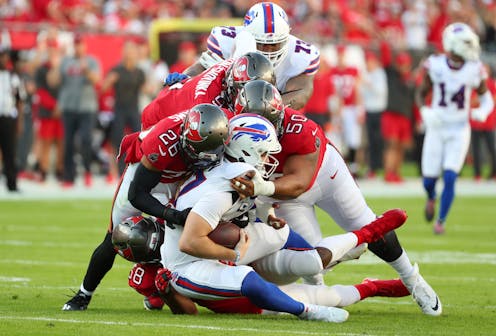
Dementia doesn’t just affect older people. Chronic traumatic encephalopathy (CTE) is a form of dementia that athletes from a whole range of sports can develop. It’s now at the centre of a number of legal challenges involving sports from rugby to American football.
We find out about the toll this type of dementia can take on family members, who are often unaware of what’s happening to their loved ones, in the second episode of Uncharted Brain: Decoding Dementia, a new podcast series available via The Anthill podcast.
After Lisa McHale’s husband Tom, a former NFL player, died in 2008, she received a request from researchers at Boston University School of Medicine to study his brain for signs of CTE.
“I remember thinking: ‘Well, Tom never had any concussion but I would imagine you need control subjects,’” McHale told us. “But when they came back to me, they said Tom had chronic traumatic encephalopathy – a pretty severe case, pretty progressed for a 45-year-old.” She says that learning more about the the disease has been extremely helpful in processing what happened to her husband.
Today, McHale is director of family relations at the US-based Concussion Legacy Foundation, which works with family members who lost loved ones after they developed CTE. Matt Smith, a sports psychologist at the University of Winchester, recently led a research project interviewing some of these family members about their experiences.
“It was very noticeable how confused the families were at first [by their loved ones’ behaviour],” says Smith. Some people talked about their husbands suddenly being prone to rage and various erratic behaviours like risky business ventures.
Smith has been impressed by the interviewees’ determination to change things for the better and make sport safer. “The family members’ motivation to be interviewed was not only to tell their story, but also if their story could help others,” he tells us.
Listen to the full episode to find out more about the experience of family members whose loved ones had CTE.
You can also read an article that Matt Smith and his colleagues Adam John White and Keith Parry wrote about their research as part of The Conversation’s Insights project.
Uncharted Brain: Decoding Dementia is hosted by Paul Keaveny, investigations editor at The Conversation in the UK, and Gemma Ware, co-host of The Conversation Weekly podcast. The series is produced and written by Tiffany Cassidy with sound design by Eloise Stevens. The executive producer is Gemma Ware.
All episodes of the series are available on The Anthill podcast channel.
You can find us on Twitter @TC_Audio, on Instagram at theconversationdotcom or via email. You can also sign up to The Conversation’s free daily email here.
Matthew Smith is affiliated with CLF-UK and has a role as research lead for Patient and Family Services. The aim of this role is to develop research that helps understand the experiences, and support patients and family members.
This article was originally published on The Conversation. Read the original article.







